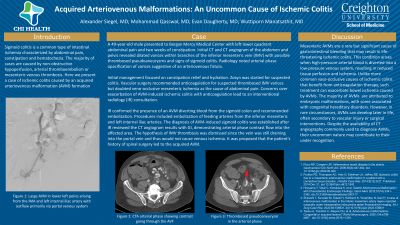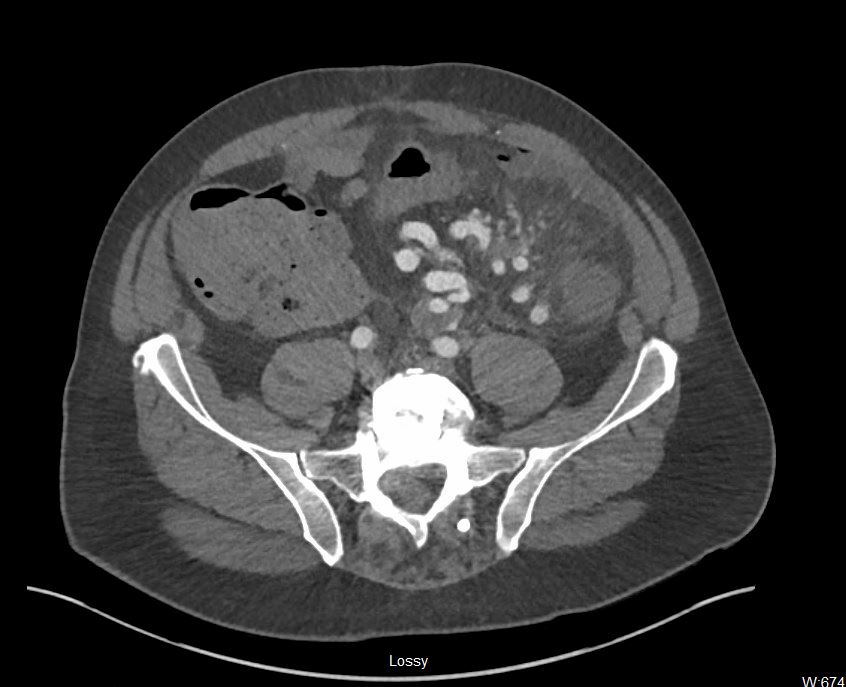Sunday Poster Session
Category: Colon
P0282 - Acquired Arteriovenous Malformations: An Uncommon Cause of Ischemic Colitis
Sunday, October 27, 2024
3:30 PM - 7:00 PM ET
Location: Exhibit Hall E

Has Audio

Alexander Siegel, MD
CHI Health Creighton University Medical Center
Omaha, NE
Presenting Author(s)
Alexander Siegel, MD1, Evan Daugherty, MD2, Mohammed Qasswal, MD1, Shane Manatsathit, MD1
1CHI Health Creighton University Medical Center, Omaha, NE; 2Creighton University School of Medicine, Omaha, NE
Introduction: Sigmoid ischemic colitis is a common type of intestinal ischemia characterized by abdominal pain, constipation, and hematochezia. The majority of cases are caused by hypoperfusion, arterial thromboembolism, or mesenteric venous thrombosis. Here we present a common case of sigmoid ischemic colitis with rare etiology - an acquired arteriovenous fistula (AVF).
Case Description/Methods: A 49-year-old male presented to the emergency department with left lower quadrant abdominal pain and two weeks of constipation. Initial computed tomography (CT) and CT angiogram of the abdomen and pelvis revealed dilated varices within branches of the inferior mesenteric vein (IMV) with possible thrombosed pseudoaneurysms and signs of sigmoid colitis. Radiology noted arterial phase opacification of varices suggestive of an AVF. Initial management focused on constipation relief, hydration, and antibiotics for suspected colitis. Vascular surgery recommended anticoagulation for suspected thrombosed IMV varices but doubted veno-occlusive mesenteric ischemia as the cause of abdominal pain. Concern regarding exacerbation of AVF-induced ischemic colitis with anticoagulation lead to an interventional radiology (IR) consultation. The diagnosis of AVF-induced sigmoid colitis was established after IR and gastroenterology multidisciplinary review of the CT angiogram results demonstrating arterial phase contrast flow into the affected area. The hypothesis of IMV thrombosis was dismissed as the vein was still draining into the portal vein and thus would not cause venous ischemia. IR angiographically confirmed the presence of an AVF diverting blood from the sigmoid colon and recommended embolization. Procedures included embolization of feeding arteries from the inferior mesenteric and left internal iliac arteries.
Discussion: Mesenteric AVFs are a rare cause of gastrointestinal bleeding that may result in life-threatening ischemic colitis. AVFs can be divided into acquired and congenital. Acquired fistulas can be further subdivided into those surgically created, or secondary to trauma resulting from accidental or procedural incidents. This condition arises when high-pressure arterial blood is diverted into a low-pressure venous system, resulting in reduced tissue perfusion and ischemia. Unlike more common vaso-occlusive causes of ischemic colitis that benefit from anticoagulation therapy, such treatment can exacerbate bowel ischemia caused by AVFs.

Disclosures:
Alexander Siegel, MD1, Evan Daugherty, MD2, Mohammed Qasswal, MD1, Shane Manatsathit, MD1. P0282 - Acquired Arteriovenous Malformations: An Uncommon Cause of Ischemic Colitis, ACG 2024 Annual Scientific Meeting Abstracts. Philadelphia, PA: American College of Gastroenterology.
1CHI Health Creighton University Medical Center, Omaha, NE; 2Creighton University School of Medicine, Omaha, NE
Introduction: Sigmoid ischemic colitis is a common type of intestinal ischemia characterized by abdominal pain, constipation, and hematochezia. The majority of cases are caused by hypoperfusion, arterial thromboembolism, or mesenteric venous thrombosis. Here we present a common case of sigmoid ischemic colitis with rare etiology - an acquired arteriovenous fistula (AVF).
Case Description/Methods: A 49-year-old male presented to the emergency department with left lower quadrant abdominal pain and two weeks of constipation. Initial computed tomography (CT) and CT angiogram of the abdomen and pelvis revealed dilated varices within branches of the inferior mesenteric vein (IMV) with possible thrombosed pseudoaneurysms and signs of sigmoid colitis. Radiology noted arterial phase opacification of varices suggestive of an AVF. Initial management focused on constipation relief, hydration, and antibiotics for suspected colitis. Vascular surgery recommended anticoagulation for suspected thrombosed IMV varices but doubted veno-occlusive mesenteric ischemia as the cause of abdominal pain. Concern regarding exacerbation of AVF-induced ischemic colitis with anticoagulation lead to an interventional radiology (IR) consultation. The diagnosis of AVF-induced sigmoid colitis was established after IR and gastroenterology multidisciplinary review of the CT angiogram results demonstrating arterial phase contrast flow into the affected area. The hypothesis of IMV thrombosis was dismissed as the vein was still draining into the portal vein and thus would not cause venous ischemia. IR angiographically confirmed the presence of an AVF diverting blood from the sigmoid colon and recommended embolization. Procedures included embolization of feeding arteries from the inferior mesenteric and left internal iliac arteries.
Discussion: Mesenteric AVFs are a rare cause of gastrointestinal bleeding that may result in life-threatening ischemic colitis. AVFs can be divided into acquired and congenital. Acquired fistulas can be further subdivided into those surgically created, or secondary to trauma resulting from accidental or procedural incidents. This condition arises when high-pressure arterial blood is diverted into a low-pressure venous system, resulting in reduced tissue perfusion and ischemia. Unlike more common vaso-occlusive causes of ischemic colitis that benefit from anticoagulation therapy, such treatment can exacerbate bowel ischemia caused by AVFs.

Figure: CTA 1: arterial phase showing contrast going through the AVF.
Disclosures:
Alexander Siegel indicated no relevant financial relationships.
Evan Daugherty indicated no relevant financial relationships.
Mohammed Qasswal indicated no relevant financial relationships.
Shane Manatsathit indicated no relevant financial relationships.
Alexander Siegel, MD1, Evan Daugherty, MD2, Mohammed Qasswal, MD1, Shane Manatsathit, MD1. P0282 - Acquired Arteriovenous Malformations: An Uncommon Cause of Ischemic Colitis, ACG 2024 Annual Scientific Meeting Abstracts. Philadelphia, PA: American College of Gastroenterology.
